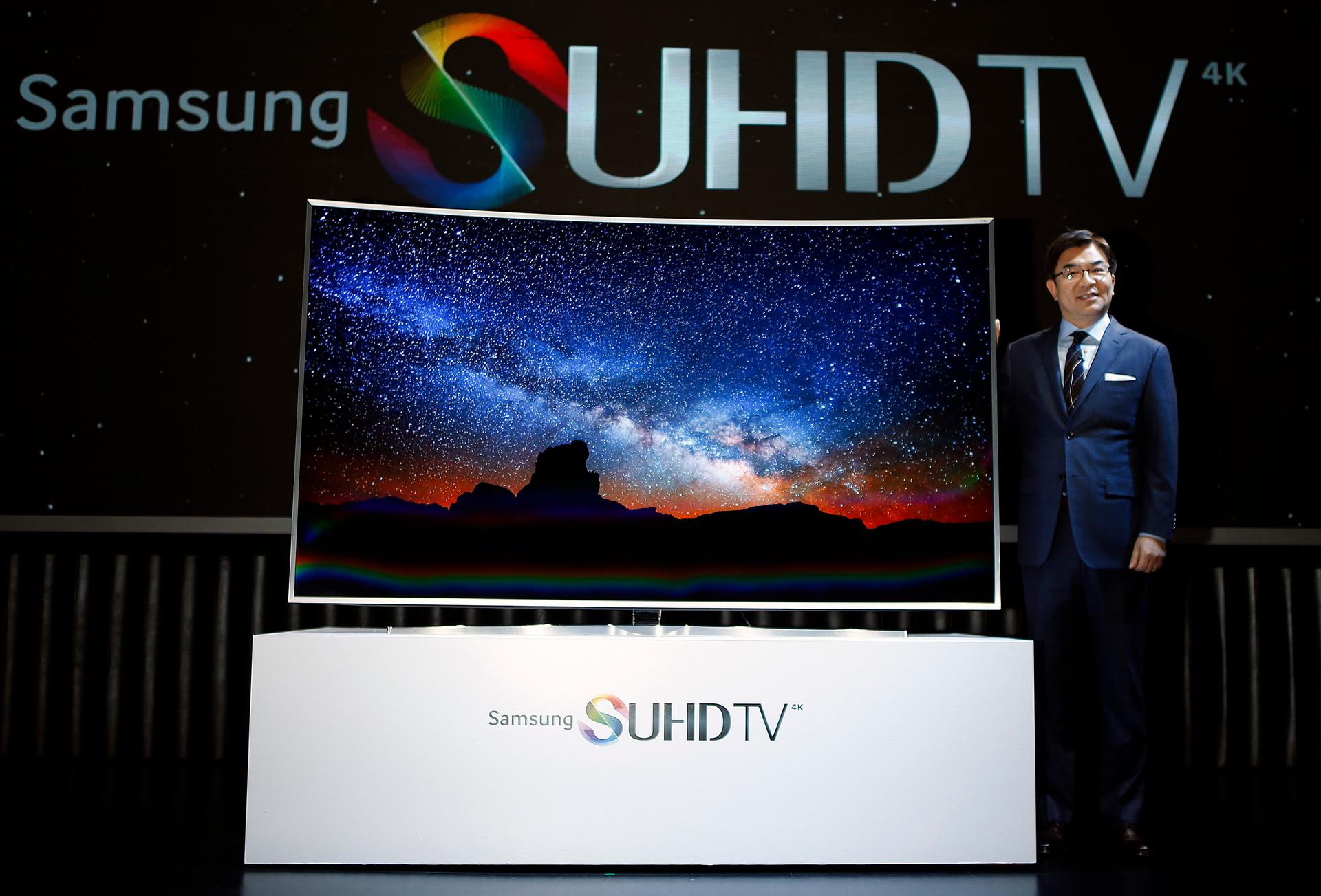Your smart TV may be spying on you — and stopping it is against the law
Kim Hyun-seok, head of Samsung Electronics' television division, poses for photographs with a Samsung Electronics S'UHD smart TV during its launch event in Seoul February 5, 2015.
Is your new smart TV spying on you? Many new TV's are equipped with a microphone that allows for voice control, a function that is akin to Apple's "Siri."
The functionality is great for innovation and ease of use (can you imagine having to push buttons on an old fashioned remote control?), but the privacy policies tucked deep inside the boxes of these new TVs reads like they were ripped out of a George Orwell novel: Here's Samsung's:
“Please be aware that if your spoken words include personal or other sensitive information, that information will be among the data captured and transmitted to a third party through your use of Voice Recognition.”
Here's a passage from George Orwell's 1984:
“Any sound that Winston made, above the level of a very low whisper, would be picked up by it, moreover, so long as he remained within the field of vision which the metal plaque commanded, he could be seen as well as heard. There was of course no way of knowing whether you were being watched at any given moment. How often, or on what system, the Thought Police plugged in on any individual wire was guesswork.”
Want to make things a little scarier? Meddle with the technology on these new smart TVs, and you may be facing felony charges under the Digital Millennium Copyright Act. The law prohibits tampering with devices that help prevent illegal copying and distribution of copyrighted material.
Michael Price is counsel in the Liberty and National Security Program at the Brennan Center for Justice at NYC School of Law. Last October he read his TV privacy policy closely and wrote about it at Salon.com.
“Most people probably gloss over the privacy policy in the same way you click on ‘I Agree’ for updating your iTunes account,” says Price. “Most people may be unaware that these sorts of warnings are in there and that this sort of technology is in play.”
Price says that many devices in addition to smart TVs — things like Siri, FitBit, or even the GPS navigation system in a car — are constantly collecting data about a person’s whereabouts and habits, and then transmitting that information back to the company that created and remotely maintains a device.
Some smart TVs even have cameras enabled with facial recognition technology and are recording images of users — all of which is mentioned in the paper manual that comes with a TV, a packet that most neglect to read.
“It’s not complete science fiction,” he says. “The idea is to get more and more data about you and that is supposed to deliver some sort of convenience, benefit or customized content like some recommendations for what you might want to watch on TV.”
How can this all be legal? By including a privacy manual with a smart TV that outlines collection and recording policies, a company can argue that a user was informed and essentially gave consent by using the device anyway. Additionally, under the law, the information recorded and collected by a smart TV is considered a third-party business record, says Price.
“What that means is you’ve given your information to a company so you’ve somehow lost your privacy interest in it,” he says. “You’re talking about a whole bunch of different kinds of data. Some of it is very, very personal, and some of it is Constitutionally protected, or at least we’d like to think that it should be Constitutionally protected. But as the law stands, a warrant is not required for police to obtain a lot of that information.”
The information collected by smart TVs and sent to companies often goes to other businesses for advertising — but the data can also be handed over the authorities if the government has a subpoena.
So what about opting out? Price says it’s easy—at least in theory.
“It’s really easy to turn the internet off,” he says. “You can disconnect the TV in that way. But it presents a really unfair trade off: You get to either use all these really nifty new pieces of technology that you bought and paid for, or you can have your privacy. But right now, it doesn’t seem like we can have it both ways. That’s what has to change.”
In a statement provided to The Takeaway, Samsung said they "take consumer privacy very seriously. In all of our Smart TVs, any data gathering or their use is carried out with utmost transparency and we provide meaningful options for consumers to freely choose or to opt out of a service. We employ industry-standard security safeguards and practices, including data encryption, to secure consumers’ personal information and prevent unauthorized collection or use.”
This story first aired as an interview on The Takeaway, a public radio program that invites you to be part of the American conversation.
Our coverage reaches millions each week, but only a small fraction of listeners contribute to sustain our program. We still need 224 more people to donate $100 or $10/monthly to unlock our $67,000 match. Will you help us get there today?
